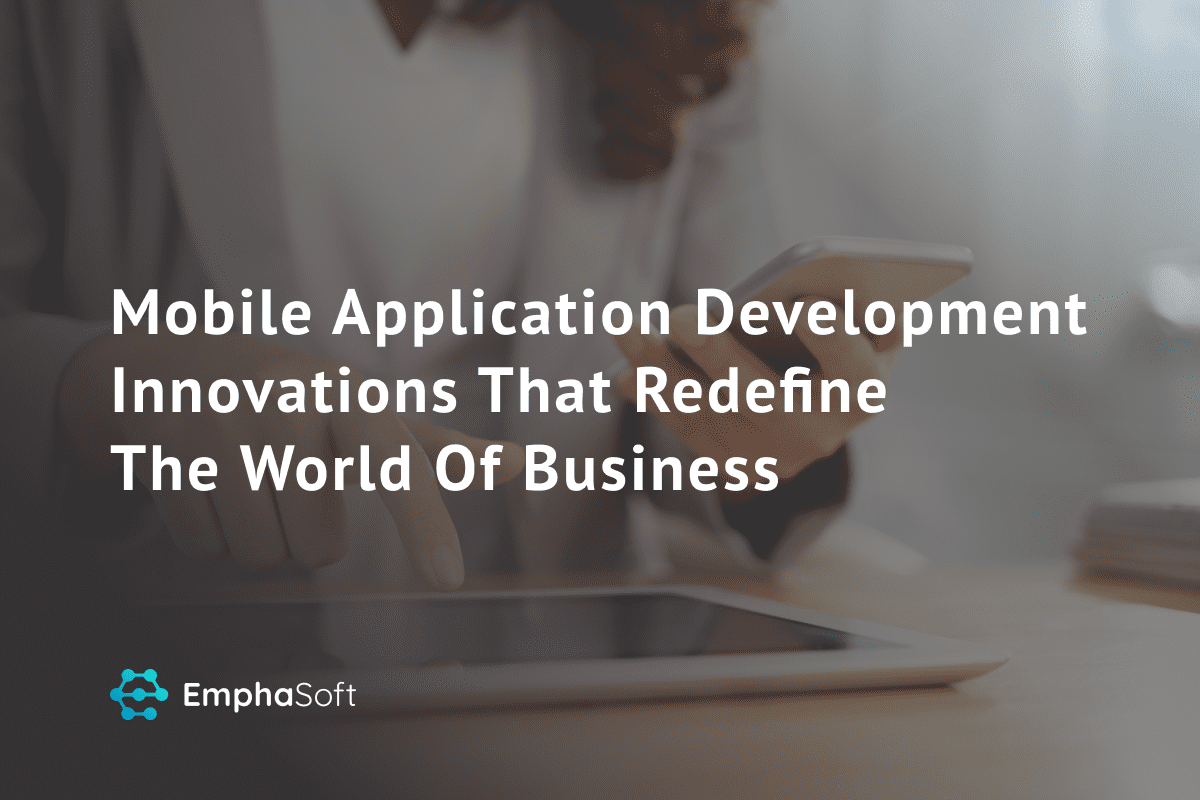Ever since their introduction, smartphones have been an integral part of our daily lives. And this trend is not slowing down. Each year we see a growth in the number of smartphone users, with mobile internet use outgrowing the use of laptops or PCs for logging onto the world wide web.
As a result, mobile application development has become a huge industry with its own rules and trends, and new mobile application development platforms are being introduced all the time. It has inevitably influenced how companies operate and do business. In this article, we will be talking about the latest innovations in mobile app development that are reshaping the business world today.
Introduction of 5G
The 5G technology becomes more widespread, it promises better speed and data transfer efficiency.
For mobile app development, a more efficient network means they can develop applications that are more robust and faster than ever. It also means rolling out features that risked slowing down the mobile app’s performance which is now mitigated thanks to 5G.
And while the adoption of 5G is still relatively slow and is yet to be widely approved and integrated, businesses are already starting to build and upgrade their mobile applications to incorporate this new technology.
Augmented and virtual reality
Augmented and virtual reality are not exactly new concepts; they’ve been around for a while to some extent. However, these technologies have received a boost over the past few years that unlocked new possibilities for mobile applications and beyond.
One of the contributors to augmented and virtual reality processes is 5G, which has enabled advanced machine learning, Artificial Intelligence, and the Internet of Things (IoT).
Perhaps one of the most popular augmented reality examples is the Pokemon Go game that is available via a mobile application, offering its users a fun quest of locating rare Pokemons across their cities. Another common use case for augmented reality is interior design where potential clients can immerse their current home into the designs of their future home to see how it will look, giving them more confidence with their design choices.
Augmented and virtual reality offer an unmatched level of engagement with users, pushing more businesses to implement them in one way or the other and making it a popular mobile application development services requirement.
Artificial Intelligence (AI)
Artificial Intelligence has been a mobile app development trend for a few years now, but it continues to gain momentum and evolve. Already today we see chatbots with built-in AI everywhere, helping clients with order issues, answering most common questions, and even selling products and services.
Machine Learning (ML)
Machine Learning coupled with Artificial Intelligence provides an untapped potential for businesses across all industries.
The combination of ML and AI allows companies to analyze large amounts of data with never-seen-before speed and detail. Data analysis is then used in planning future strategy, analysing current successes, and making many data-driven decisions.
In enterprise mobile application development, ML and AI can upgrade customers’ experiences by providing them with personalised offers and engagement, boosting their loyalty and satisfaction with the product and services the company offers.
Wearables
Wearables are mostly used for health tracking these days, with the potential of branching out to other functions. Apple Watch, for example, is used to read messages and do so much more than merely tracking your heart rate and sleep pattern.
The good news for wearables is that humanity’s focus on health and well-being is only growing. Even better, every piece of wearable technology requires an application to unlock its full potential.
For all companies focused on a healthy lifestyle, this trend would mean they need to consider developing a mobile application and building in the tools for those wearables to help clients stay healthy and well.
As this trend continues to grow, we will see more companies tapping into mobile application development outsourcing to leverage the necessary expertise they lack for producing powerful mobile apps.
Beacon technology
Beacon technology is a game changer for the world of retail, restaurants, and tourist attractions.
This location-based technology uses Bluetooth connectivity to identify how close we are to a specific location. Once we come closer to, let’s say, a beauty store, the application on our phone can send us a push with personalised marketing offers or messages encouraging us to come in and shop.
On-demand applications
On-demand mobile applications have boomed during the strict pandemic lockdowns, enabling clients to order groceries, takeouts, medicines, clothes, and anything you can imagine.
Such apps have quickly become a part of the new normal and are likely to stay with us for a long time, as they allow clients to better manage their time and avoid having to run for errands or to go out for dinner.
On-demand apps require serious data management because their success often depends on how well they understand their clients and their ability to predict their needs.
Blockchain
Blockchain first emerged as a technology used in the crypto world but it has the potential to be used pretty much anywhere.
Blockchain, simply put, is a technology that provides decentralised databases that creates a unique level of security for sensitive data and digital identity, while preventing them from being stolen or misused. Blockchain can be used, for example, in contract signing with its smart contract technology, allowing the seller and the buyer to have a secure transaction without needing to use the middleman or escrow services.
Any business that offers platforms for selling and buying products should consider blockchain as a requirement in their custom mobile application development process.
The future of mobile applications
With continued digitalisation and the growth of mobile phone users worldwide, mobile apps are here to stay.
Many of the mobile applications address the common user pains, help clients have more fun with the product or service, and do many things that were previously only available in person or via the phone or email.
Both Android and iOS mobile application development are booming with more companies outsourcing mobile application development or hiring an internal team to create them.
If you are considering creating your own mobile app, make sure that customer needs and convenience remain at the centre of your attention. Users have so many options with mobile apps, that simply browsing through them creates fatigue. They will not be using the mobile app that is either not user-friendly or does not deliver them value.
Read next: Tips for making your mobile app stay successful and fresh









 Schedule a Discovery Call
Schedule a Discovery Call Schedule Call
Schedule Call